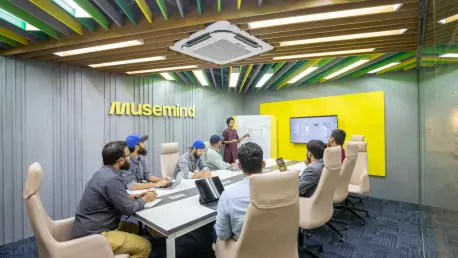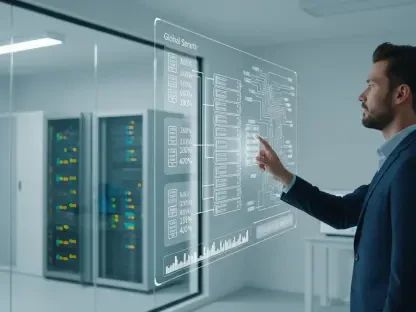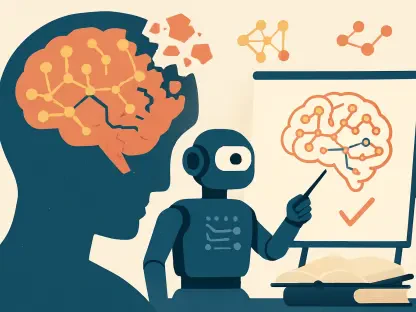In this insightful interview, Chloe Maraina, a business intelligence expert deeply engaged in the evolving landscape of data management and AI integration, shares her thoughts on the transformative potential of AI agents in enterprises. Chloe delves into how the Model Context Protocol (MCP) stands out as a pivotal player in addressing integration challenges, exploring its broader implications beyond just technical innovation. She provides a comprehensive view of how MCP strengthens the capabilities of AI agents by ensuring seamless data access and compliance, and outlines practical steps IT leaders can take to embrace this promising technology without major disruptions.
Can you explain the concept of AI agents and how they are transforming enterprise operations?
AI agents are essentially systems that are designed to perform complex, multi-step tasks autonomously, making decisions with minimal human intervention. They’re transforming enterprise operations by automating routine tasks, thus enabling businesses to operate more efficiently and make more informed decisions. These agents are not only automating manual processes but also enhancing decision-making by analyzing large datasets to provide actionable insights.
Recent data indicates that many organizations are using or planning to use AI agents. Why do you think there’s such a strong shift toward adopting these systems?
The shift towards AI agents is largely driven by the need for efficiency and scalability. Organizations are increasingly recognizing that these systems can handle tedious and repetitive tasks, allowing human employees to focus on work that requires creativity and complex problem-solving. Additionally, AI agents offer a competitive advantage by enabling quicker and more accurate data analysis, ultimately leading to better business outcomes.
What challenges do AI agents face with integration into existing enterprise systems?
AI agents often face integration challenges because they operate in isolation, separate from the core systems containing business data and operational logic. This lack of integration makes scaling difficult and maintenance expensive. Without standardized integration processes, these agents can’t fully utilize the existing infrastructure, limiting their potential impact.
How does the Model Context Protocol (MCP) address integration challenges for AI agents?
MCP tackles these challenges by providing a standardized interface for secure, two-way connections between AI agents and enterprise systems. By eliminating the need for bespoke integrations, MCP simplifies the process, allowing AI systems to access both structured and unstructured data seamlessly across various storage and application environments.
Why is MCP considered more than just a technical innovation for IT infrastructure?
MCP is more than a technical innovation because it represents a strategic shift in IT infrastructure. It allows enterprises to support intelligent, autonomous operations by ensuring that AI initiatives are scalable and sustainable. This protocol also addresses critical concerns like data governance, compliance, and cybersecurity, making it a holistic solution for integrating AI agents.
Can you elaborate on how MCP goes beyond traditional APIs for integrating AI systems?
Traditional APIs often require custom-built solutions for different applications, leading to complexity and higher maintenance. MCP goes beyond this by offering a universal, vendor-agnostic standard that enables seamless interactions across systems without the need for custom connectors or middleware, thus streamlining integration efforts significantly.
How does MCP help in accessing structured and unstructured data for AI agents?
MCP acts as a bridge that enables AI agents to access and interact with both structured and unstructured data across diverse platforms. This capability allows AI systems to perform more meaningful actions and adapt to changing business contexts in real-time, enhancing their usefulness and effectiveness within the enterprise.
What benefits does MCP offer for organizations looking to scale their AI initiatives?
For organizations planning to scale their AI initiatives, MCP reduces integration overhead and accelerates deployment timelines. It helps maximize the reuse of existing infrastructure while minimizing technical debt and improving resilience. This scalability is crucial for organizations to quickly respond to evolving business needs while maintaining control over their IT environment.
How does MCP’s ‘build once, integrate everywhere’ philosophy impact IT teams?
This philosophy reduces the need for repetitive work in developing point-to-point integrations. IT teams can focus more on innovation and strategic development instead of managing complex plumbing activities. It leads to a lower total cost of ownership and a more agile response to new business requirements.
In what ways does MCP support data governance, compliance, and cybersecurity?
MCP includes features that support explicit user consent, data access auditing, and secure execution environments with enforced boundaries. These capabilities ensure that as AI agents operate, they do so within a framework that respects data governance and compliance policies, while also keeping cybersecurity threats at bay.
Can you share examples of real-world applications where MCP can be strategically used in enterprises?
In legal and procurement departments, AI agents can utilize MCP to monitor document repositories and extract critical information, streamlining contract management while ensuring compliance. Similarly, in research and development, AI agents can help synthesize data from various studies for actionable insights. In architecture, engineering, and construction, MCP-enabled agents can automate project coordination tasks, reducing errors and enhancing collaboration.
How can legal and procurement teams benefit from AI agents integrated through MCP?
These teams can see substantial time savings and improved accuracy in document review processes. AI agents can automatically extract and analyze contract clauses, flag inconsistencies, and ensure documents are up to compliance standards, immensely benefiting legal and procurement operations.
What advantages does MCP offer for research and development departments?
R&D departments can leverage MCP to harness AI agents for aggregating and analyzing vast amounts of internal data, identifying research patterns, and generating valuable insights. This can transform raw data into structured knowledge, facilitating innovation and strategic decision-making.
How does MCP aid in improving project coordination in architecture, engineering, and construction industries?
In these sectors, MCP facilitates better project coordination by enabling AI agents to manage document versioning, automate reporting, and flag potential compliance issues. This results in smoother project execution, fewer errors, and enhanced operational efficiencies.
How can IT professionals initiate the adoption of MCP without overhauling their existing IT stack?
IT professionals can start by implementing MCP in commonly used systems like file storage and collaboration platforms. They can also utilize sandbox environments to explore and evaluate agent capabilities incrementally, allowing for a phased adoption approach that aligns with change management practices.
What role does a hybrid cloud platform play in the adoption of MCP?
A hybrid cloud platform provides the necessary infrastructure for MCP’s deployment by enabling seamless data access across both on-premises and cloud environments. It ensures that AI agents have the capability to operate across diverse systems, maintaining governance and performance standards.
How does the combination of hybrid cloud architecture and MCP ensure successful AI deployments?
This combination creates a resilient and flexible IT environment that supports secure and standardized integration. It ensures that AI deployments are scalable, maintain compliance mandates, and operate efficiently across various platforms, leading to successful AI initiatives.
Can you discuss the importance of standardized access to data for AI agents in modern business operations?
Standardized data access is crucial for AI agents, as it ensures they can retrieve and process information efficiently and accurately. It eliminates data silos, enhances operational decision-making, and ensures that AI systems can adapt swiftly to changing business conditions, thereby driving modern enterprises forward.
What role could MCP potentially play in the future of AI integration and enterprise operations?
MCP has the potential to become a cornerstone in the future of AI integration by continuously adapting to evolving technologies and business needs. It positions enterprises to harness intelligent systems effectively, driving innovation and efficiency while maintaining robust governance and compliance standards.









